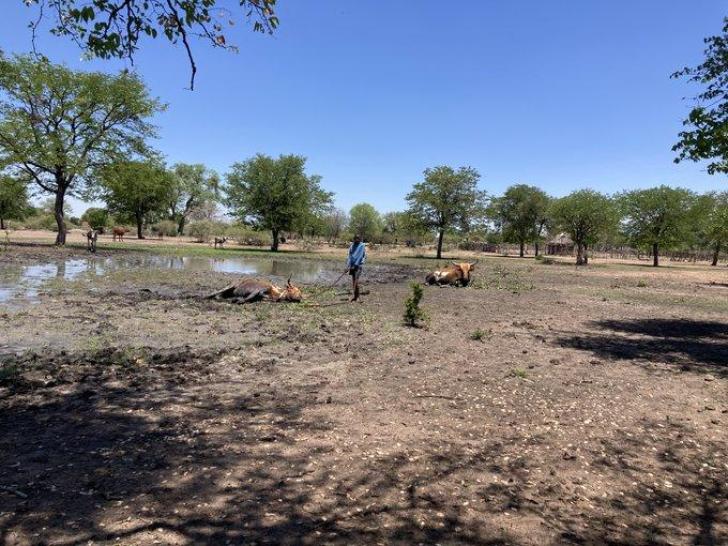News / National
Extremely hot, dry conditions jolt farmers
06 Dec 2024 at 06:29hrs |
1 Views

Zimbabwe is experiencing an extreme heatwave that began on November 30, raising alarm among farmers and health experts. Temperatures across the country are soaring, with some areas expected to reach up to 44 degrees Celsius, according to the Meteorological Services Department (MSD). The heatwave is projected to persist until mid-next week.
Farmers are grappling with the effects of the intense heat on their crops, most of which are at the germination stage, following last month's initial rains. In some areas, it has been over two weeks since meaningful rainfall, leading to dry pastures and depleted water sources critical for livestock.
Cattle breeder Mr. Jairos Mahlangu from Matabeleland South expressed concern about the national herd, stating:
"Most farmers rely on borehole water for their cattle, but water tables are very low. Cows are already stressed, and prolonged heat will worsen the situation, especially for communal farmers."
Farming expert Mr. Innocent Winston Babbage added that the germinating crops are at risk of wilting if the extreme temperatures persist. He emphasized the need for climate mitigation measures, highlighting the adverse effects of deforestation and uncontrolled mining.
The intense heat poses serious health risks, with experts warning of heat strokes and dehydration. Mpilo Central Hospital Clinical Director, Professor Solwayo Ngwenya, cautioned that vulnerable groups such as the elderly, infants, and individuals with chronic conditions are at higher risk.
"The heat could lead to sudden death from dehydration and electrolyte imbalances. People should stay hydrated, avoid unnecessary exposure, and wear protective clothing when outdoors," he advised.
The MSD has issued guidelines to mitigate the impact of the heatwave: For farmers: Increase irrigation hectarage, provide shade and water for livestock, and protect crops from excessive evaporation. For the public: Stay in shaded areas, drink plenty of fluids, and avoid prolonged exposure to direct sunlight. Motorists have been urged to drive cautiously as high temperatures could increase the risk of tyre bursts.
Experts attribute the extreme conditions to climate change and emphasize the urgent need for sustainable practices to mitigate its effects. Farmers are hoping for a return of rains soon to salvage their crops and livestock.
The MSD, in collaboration with the Department of Civil Protection, continues to monitor the situation and provide updates. In the meantime, citizens are urged to take precautions to safeguard their health and livelihoods.
Farmers are grappling with the effects of the intense heat on their crops, most of which are at the germination stage, following last month's initial rains. In some areas, it has been over two weeks since meaningful rainfall, leading to dry pastures and depleted water sources critical for livestock.
Cattle breeder Mr. Jairos Mahlangu from Matabeleland South expressed concern about the national herd, stating:
"Most farmers rely on borehole water for their cattle, but water tables are very low. Cows are already stressed, and prolonged heat will worsen the situation, especially for communal farmers."
Farming expert Mr. Innocent Winston Babbage added that the germinating crops are at risk of wilting if the extreme temperatures persist. He emphasized the need for climate mitigation measures, highlighting the adverse effects of deforestation and uncontrolled mining.
The intense heat poses serious health risks, with experts warning of heat strokes and dehydration. Mpilo Central Hospital Clinical Director, Professor Solwayo Ngwenya, cautioned that vulnerable groups such as the elderly, infants, and individuals with chronic conditions are at higher risk.
"The heat could lead to sudden death from dehydration and electrolyte imbalances. People should stay hydrated, avoid unnecessary exposure, and wear protective clothing when outdoors," he advised.
The MSD has issued guidelines to mitigate the impact of the heatwave: For farmers: Increase irrigation hectarage, provide shade and water for livestock, and protect crops from excessive evaporation. For the public: Stay in shaded areas, drink plenty of fluids, and avoid prolonged exposure to direct sunlight. Motorists have been urged to drive cautiously as high temperatures could increase the risk of tyre bursts.
Experts attribute the extreme conditions to climate change and emphasize the urgent need for sustainable practices to mitigate its effects. Farmers are hoping for a return of rains soon to salvage their crops and livestock.
The MSD, in collaboration with the Department of Civil Protection, continues to monitor the situation and provide updates. In the meantime, citizens are urged to take precautions to safeguard their health and livelihoods.
Source - The Herald
Join the discussion
Loading comments…





























